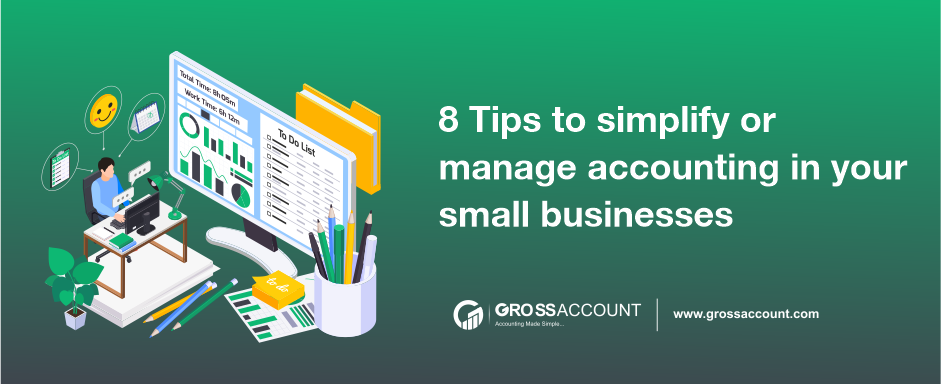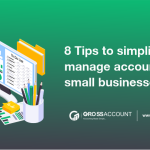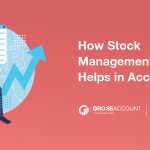Introduction
If you are a small businessman you always think that it might someday going to be a bigger business. However, businesses’ most important part is their finance and their consumers. If consumers are not increasing then it might some problems in the business. But if the business growth fluctuates because of finance then you might want to consider this problem in your sight.
Managing your accounting means that businesses keep track of their business expenses and monitor the costs. Also, it focuses on the financial reports and payments of your customers.
Moreover, accounting helps to make informed decisions. It also ensures compliance with tax regulations. For many small business owners, accounting can be difficult to occult.
In this blog, we will explore different tips to help you streamline your accounting processes and gain better control over your finances.
Tips to manage accounting in small businesses

1) Track Your Business Expenses
Tracking your business expenses is crucial for maintaining financial stability and ensuring the long-term success of your venture. Without proper expense tracking, you may lose control of your finances, overspend, or miss out on valuable tax deductions. Here’s why tracking your expenses is essential:
Effective budgeting is the important part, which we will talk more about in this blog. Tracking expenses allows you to create a realistic budget for your business. You can allocate funds to different areas, such as marketing, operations, and employee salaries, based on actual expenditure data.
Keeping detailed records of expenses can help you identify tax-deductible items, which can significantly reduce your tax liability. Common deductible expenses include office supplies, travel expenses, and depreciation on assets.
However, by tracking expenses regularly, you gain a clear understanding of where your money is going. This visibility enables you to make informed decisions about cost-cutting and resource allocation.
Monitoring expenses helps prevent overspending and keeps your business financially disciplined. It allows you to identify areas where you can cut costs without compromising quality.
2) Your Business Bank Account Must Be Different
One fundamental financial practice for business owners is to separate personal and business finances. However, it keeps your business finances separate from personal funds. It often requires legal structure for various businesses, like LLCs and corporations.
- There are some benefits of selecting different bank accounts.
- A separate business account makes it easier to track income and expenses related to your business.
- Maintaining a dedicated business bank account adds a level of professionalism to your enterprise.
- Separating personal and business finances can protect your personal assets from business-related liabilities.
3) Regulate with Tax Deduction
Tax management is a critical aspect of financial management for businesses.
- Engaging a tax professional or accountant can help you navigate the complex world of tax regulations. They can identify tax-saving opportunities and ensure compliance with tax laws.
- Be aware of all the tax deductions available to your business. Common deductions include expenses related to office space, equipment, travel, and employee benefits.
- Tax laws change regularly. Staying informed about tax code changes and adjusting your tax strategy accordingly can save your business money and prevent legal issues.
- Ensure that you file your taxes accurately and on time to avoid penalties and interest charges. Timely filing also ensures that you receive any eligible tax refunds promptly.
4) Maintain Accurate Records
Consistent record-keeping is crucial for effective accounting. Keep all your financial documents, such as receipts, invoices, and bank statements, organized and up-to-date. Consider using digital tools to scan and store paper documents for easy retrieval and long-term storage. Accurate records will make it simpler to reconcile accounts and prepare financial statements.
You can keep all your financial documents, such as receipts, and bank statements accurate as per the requirements. Accurate record-keeping is the backbone of financial management.
Maintaining detailed records of income and expenses provides transparency into your business’s financial health. Business records should be audited and well-maintained. It will make the process smoother and less stressful.
Accurate data allows you to identify trends and plan for the future.
5) Try to Improve Cash Flow
Cash flow management is vital for the survival and growth of small businesses. Creating accurate ledger reports reduces the problems of cash flow management. A positive cash flow can provide you with financial stability and the ability to invest in business expansion.
You can use or Implement a streamlined payroll system to ensure timely payment to employees. Consider automating payroll to reduce errors and save time. Businesses can send out invoices promptly and follow up on overdue payments. However, you can negotiate favourable payment terms with suppliers to align outgoing payments with incoming revenue.
6) Hire a Professional and Set Up a Budget
allocate resources efficiently, and set financial goals. Regularly review your budget to track your progress and make necessary adjustments to stay on track.
With any budget a state would not run properly, so how the business should be. A well-structured budget can help you to monitor your income and expenses. It allocates resources efficiently and sets financial goals.
However, Hiring a financial professional, such as an accountant or financial advisor, can be a wise investment for your business. A professional can assist in creating a realistic budget that aligns with your business goals.However, financial advisors can help you develop a long-term financial plan, including retirement and investment strategies.
Moreover, They can identify and mitigate financial risks that your business may face, ensuring its financial stability.
7) Review Financial Reports
There are different types of financial reports are available in different software. Income statement, Balance Sheet, and Cash Flow statement help to understand how a business is performing in the market. An income statement is an overview of revenue, expenses, and profit or loss over a specific period of time.
Also Read: Trial Balance: Check Your Financial Records with It
However, the Balance Sheet shows your assets, liabilities and equity at a specific point in time. Compares your budgeted expenses and revenue with actual figures, highlighting variances that require attention.
8) Choose the Right Accounting Software
Choosing the right accounting software can be a tedious task. Firstly, before choosing the accounting software businesses need to understand the requirements of their organisation. You need to ensure that software can grow with your business. It accommodates increased transactions and complexity.
However, you need to look for software that can integrate with other business tool such as CRM systems and payroll software. Also, prioritize data security and choose software with encryption and authentication features.
Want to Automate Your Accounting?
GrossAccount is the best accounting software that is customizable according to the needs of the businesses. GrossAccount’s GST accounting software supports different features such as GST Compliant Invoices, GST Auto Calculation, generating intelligent Reports, GST filing, Purchase Management, and Sales Management.






